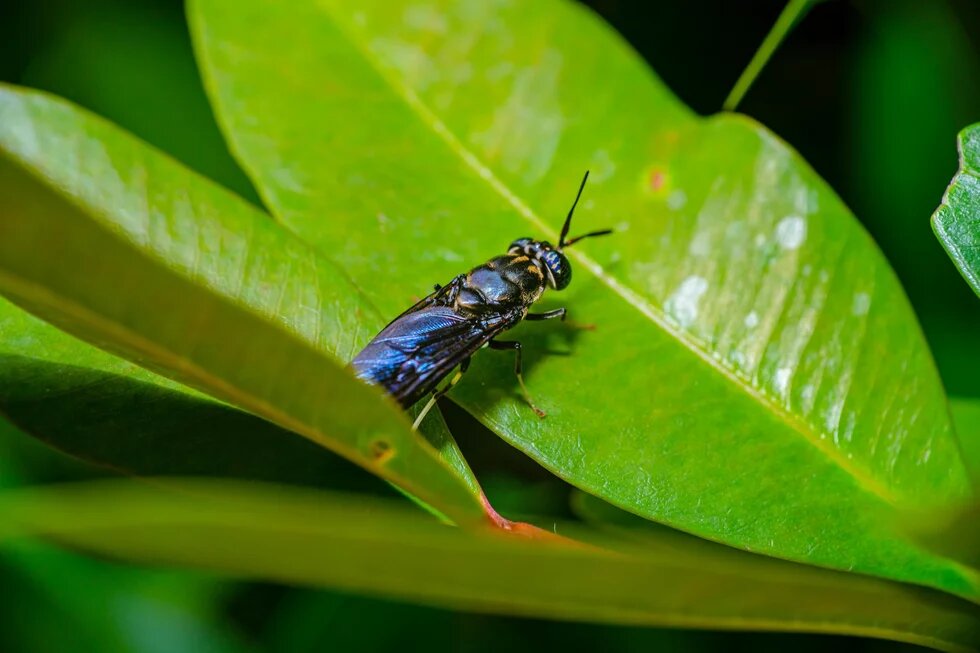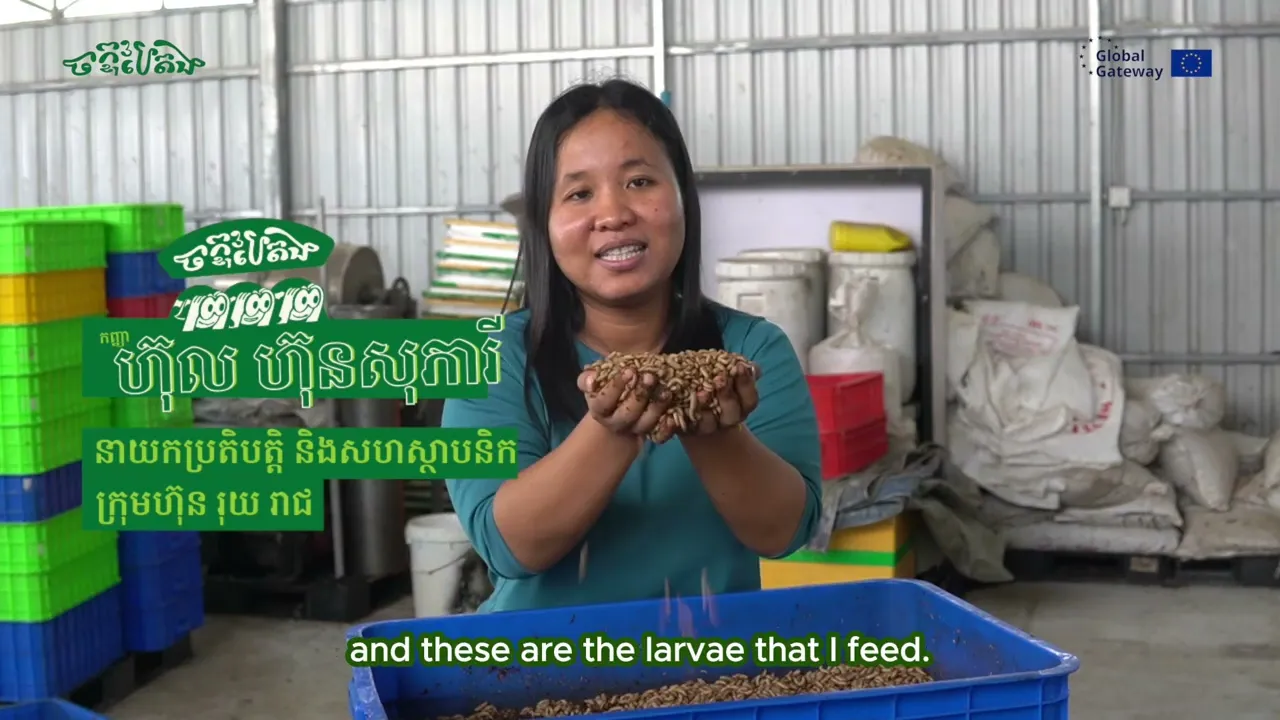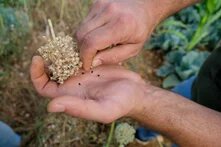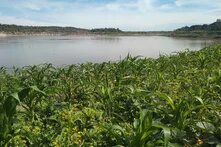Over-reliance on chemical inputs has left Cambodia’s agriculture vulnerable to environmental and economic pressures. The company Evola Cambodia, formerly a project called Ruy Reach, illustrates how black soldier fly (BSF) technology can convert organic waste into sustainable fertilizer and feed, supporting both farmers and the environment.

Agriculture remains the backbone of Cambodia’s economy, contributing around 22 percent to GDP and employing over 3 million people, or about 36 percent of the workforce, primarily in rural areas. The sector is dominated by rice cultivation, which covers more than 3 million hectares and yields around 11 million tons annually, but also includes significant production of cassava, maize, rubber, and vegetables. While organic farming methods have expanded in recent years, the over-application of chemical fertilizers continues to pose serious risks, contributing to the degradation of soil quality and water resources. The majority of farmers continue to depend on inorganic fertilizers such as urea, NPK (Nitrogen (N), Phosphorus (P), and Potassium (K)), or DAP(Diammonium Phosphate), while only about one-third make additional use of organic alternatives such as manure from their livestock.
Cambodia’s fertilizer supply is almost entirely import-dependent.
Cambodia’s fertilizer supply is almost entirely import-dependent, with imports amounting to an estimated USD 325 million annually and representing roughly 98 percent of the national market. Domestic production remains minimal, leaving farmers exposed to international price fluctuations and supply disruptions. Fertilizer imports began in 1979–1980 with 35–40,000 tons annually from Vietnam and continued largely unregulated throughout the 1990s. Post-conflict recovery priorities and limited institutional capacity delayed regulatory oversight until the passage of the 2012 Law on the Management of Pesticides and Fertilizers. Yet weak enforcement and low farmer awareness of correct application have undermined its effectiveness in practice, contributing to both environmental harm and economic inefficiency.
Cambodia’s agricultural sector depends on inorganic fertilizers
At the farmer level, Cambodia operates as a price-driven market, where purchasing decisions are shaped more by affordability than by agronomic suitability. This reflects the socio-economic position of farmers, who are among the poorest segment of the population and often have limited formal education. In rural areas, literacy rates remain low, and some farmers lack even basic numeracy skills, including the ability to calculate percentages or fractions. These constraints directly affect farming practices, contributing to inefficient fertilizer use and soil management. Although organic fertilizers are increasingly promoted as a sustainable alternative, they are generally more expensive and, in the short term, less effective than inorganic fertilizers, limiting uptake among resource-constrained smallholders.
Taken together, these dynamics highlight the structural vulnerabilities of Cambodia’s agricultural sector: dependence on external inputs, weak regulatory capacity, and limited farmer knowledge. Addressing these challenges requires a twofold approach: improving farmer education and extension services to support balanced nutrient use, while simultaneously creating incentives for the gradual adoption of sustainable practices. Without such measures, the sector risks perpetuating cycles of dependency, environmental degradation, and economic precarity.
Within this context, Cambodia has begun to see the rise of experimental models such as Evola, which attempt to address structural vulnerabilities by converting organic waste into locally produced fertilizer and feed using black soldier fly larvae (BSF).
Evola’s approach reduces dependence on imported fertilizers
BSF larvae upcycle organic waste into two high-value products: nutrient-rich organic fertilizer (frass) and protein-rich animal feed.
The company Evola Cambodia, formerly a project called Ruy Reach, adopted its new identity to reflect an international outlook and its commitment to innovation. The name blends ‘e’ for evolution with ‘vola,’ Latin for ‘fly,’ symbolizing both transformation and the BSF at the core of its sustainable agriculture model. The startup employs BSF larvae to upcycle organic waste into two high-value products: nutrient-rich organic fertilizer (frass) and protein-rich animal feed. The frass (organic fertilizer) improves soil health and enhances crop yields, thereby reducing dependence on imported chemical fertilizers. At the same time, BSF larvae provide an alternative protein source for poultry, pigs, and fish, replacing expensive fishmeal and soy. Given that feed accounts for 60–70 percent of livestock production costs, this substitution has the potential to substantially reduce financial pressures on farmers.
How Evola Cambodia Upcycles Organic Waste With the Black Soldier Fly - Heinrich-Böll-Stiftung
 Watch on YouTube
Watch on YouTube
Beyond these economic benefits, BSF products offer co-benefits that support farm resilience. Frass enhances soil carbon sequestration and reduces nitrous oxide emissions, while the antimicrobial properties of BSF larvae strengthen animal health and contribute to higher yields and improved farm incomes. Evola’s small-scale systems are designed to process household and community waste into fertilizer and feed, creating new livelihood opportunities for smallholder farmers, particularly in rural areas.
At present, the initiative remains at a pilot stage, operating on the outskirts of Phnom Penh near Techo International Airport to ensure proximity to waste sources. The facility employs five staff and currently processes approximately 150 tons of organic waste annually, yielding close to 30 tons of frass. The medium-term objective is to expand operations one hundredfold, reaching a processing capacity of approximately 15,000 tons of organic waste and 3,000 tons of frass per year.
Black Soldier Fly farming is good for the climate
The environmental benefits of BSF farming are equally notable. Compared to conventional composting, it can reduce greenhouse gas emissions by up to 50 percent while diverting organic waste from methane-intensive landfills. In addition, frass contributes to soil carbon sequestration and lowers nitrous oxide emissions. Cambodia’s tropical climate, with year-round temperatures between 25–35°C, provides ideal conditions for BSF survival and growth, keeping the technology efficient and low-tech in such settings. Notably, because organic waste decomposes more rapidly in tropical open landfills, releasing high levels of methane and CO₂, processing it through BSF systems in Cambodia represents a particularly cost-effective and climate-friendly mitigation strategy. By contrast, European producers such as Innovafeed require energy-intensive climate control to sustain BSF growth and rely on advanced automation to offset high labor costs, a strategy that demands substantial capital investment.
Compared to conventional composting, it can reduce greenhouse gas emissions by up to 50 percent.
By advancing initiatives such as Evola, Cambodia has the opportunity to transform organic waste into a valuable resource, enhancing agricultural productivity, strengthening rural livelihoods, and reducing environmental pressures. Scaling BSF-based solutions would not only support national priorities for sustainable agriculture but also contribute to the achievement of the Sustainable Development Goals on zero hunger and climate action.

